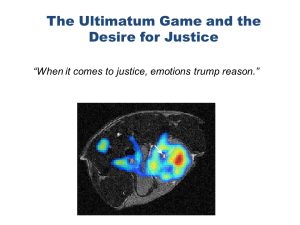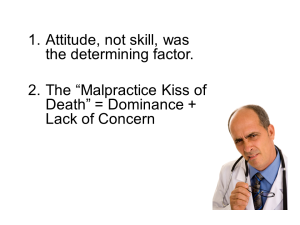Add Credibility and Up Your Fascination Factor with Cool Scientific Research
 In an earlier blog post about Sally Hogshead’s book Fascinate, we explored the importance of making your ideas fascinating.
In an earlier blog post about Sally Hogshead’s book Fascinate, we explored the importance of making your ideas fascinating.
One of the best ways to amp up the fascination factor of your presentations–and add credibility– is to include fascinating scientific research.
Doing so makes your key points far “stickier”, to use Made to Stick author’s Chip and Dan Heath’s term.
I’m a big fan of using scientific research for personal reasons because I just find it immensely fascinating. One of the things I’ve learned over the years is that experts in a particular scientific field are so focused on their specialty, they often don’t know about research from disparate fields, nor do they try to translate their ideas into practical applications.
One of the things I love to do is connect the dots from research from disparate disciplines and translate the take away message to practical strategies leaders can use in the workplace and people can use in their personal lives.
I am also a big fan of sharing scientific research in my talks because love it.
Over the years, when people have told me they really like my presentations, two of the four most common comments are:
1. They love the use of stories
2. They love it that I use scientific research. They often say they love the research because it makes what I say more credible…especially to the more skeptical members of their team who think anything but spreadsheets and the hard sciences is “soft.” They also just find the research (when told well) just plain fascinating.
Here is an excerpt from my audio program Storytelling for Leaders that illustrates two examples of some of my favorite research, me telling the story behind it, and then exploring the implications.
 One of the areas of research you’ll hear is the fascinating line of inquiry called the Ultimatum Game. The Ultimatum Game is from the world of neuroeconomics. The findings from this research has huge implications for leaders. More specifically, it reveals our hard-wired desire for fairness and how irrational people are about unfairness. In the audio clip, you’ll hear me talk about the leadership implications.
One of the areas of research you’ll hear is the fascinating line of inquiry called the Ultimatum Game. The Ultimatum Game is from the world of neuroeconomics. The findings from this research has huge implications for leaders. More specifically, it reveals our hard-wired desire for fairness and how irrational people are about unfairness. In the audio clip, you’ll hear me talk about the leadership implications.
The second area of study is some really fascinating research involving audio recordings of physicians being used to predict who gets sued and who doesn’t. After sharing the story behind the research, I talk about the implications of this research on managers and leaders, and how you cannot afford to be careless with your use of power.
 I first read about this research in Malcom Gladwell’s book Blink. You can find a link at his site for the PDF of the article by Nalini Ambady et al., “Surgeons’ Tone of Voice: A Clue to Malpractice History.” detailing her research.
I first read about this research in Malcom Gladwell’s book Blink. You can find a link at his site for the PDF of the article by Nalini Ambady et al., “Surgeons’ Tone of Voice: A Clue to Malpractice History.” detailing her research.
Hopefully you will notice how both scientific story research makes the points both more intriguing and more powerful.
Just a heads up…I will be doing a free webinar titled “Fascinating Inspiring U”. To make sure you get notified about it, sign up for future announcements in the box below my picture.
Examples of Books that Contain Fascinating Scientific Research and the Stories Behind It
Blink by Malcom Gladwell
Switch by Chip and Dan Heath
Influencers by Kerry Patterson et al
Predictably Irrational by Daniel Ariely
Internet Sources of Fascinating Research
Alltop.com’s neuroscience section
Podcast: Play in new window | Download
